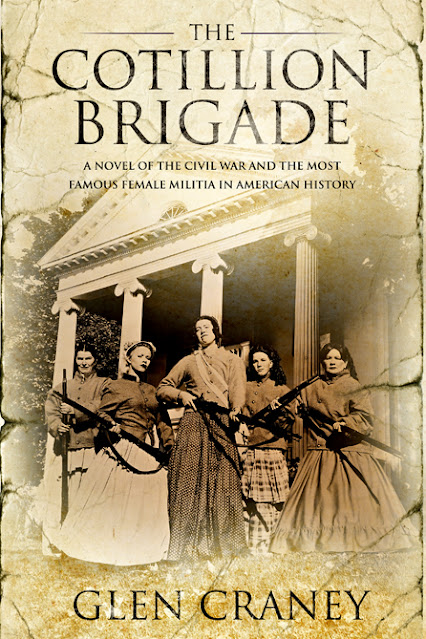Book Title: The Cotillion Brigade (A Novel of the Civil War and the Most Famous Female Militia in American History)
Based on the true story of the celebrated Nancy Hart Rifles, The Cotillion Brigade is an epic novel of the Civil War’s ravages on family and love, the resilient bonds of sisterhood in devastation, and the miracle of reconciliation between bitter enemies.
1856. Sixteen-year-old Nannie Colquitt Hill makes her debut in the antebellum society of the Chattahoochee River plantations. A thousand miles north, a Wisconsin farm boy, Hugh LaGrange, joins an Abolitionist crusade to ban slavery in Bleeding Kansas.
Five years later, secession and war against the homefront hurl them toward a confrontation unrivaled in American history.
LaGrange,
Georgia
July
1861
Gus
hobbled up the porch steps of his sister Caroline’s house carrying several
newspapers. He limped inside and dropped the pile on the parlor table used by
the LaGrange women to sew uniforms. Unrolling the most recent edition of the
Atlanta Intelligencer, he displayed its gaudy headlines:
BATTLE OPENED AT MANASSAS
The Lincolnites Attempt To Cross At Bull Run!
They Are Three Times Repulsed With Heavy Loss!
THEY RETREAT IN GREAT CONFUSION!
Fighting Lasts Four Hours!
Nancy
bounded to her feet and sent the needles and thimbles scattering. “The rumors
are true! Read us the details.”
Gus
stored his cane on the umbrella rack and plopped into his favorite high-backed
chair, set near the porch window to take advantage of the river breeze. The
women gathered around, some scooting their chairs closer, others sitting on the
floor. He cleared his voice as if an actor preparing a scene.
“Get
on with it,” said Nancy.
Gus
retaliated by taking his time removing his reading spectacles from his pocket,
opening and closing the case, and polishing the lenses with his kerchief. “I
pay for the subscriptions to these publications. You’d think that might entitle
me to a lemonade.”
Caroline
threw up her hands. “Leila, would you please be a dear and bring the pitcher
from the cellarette to pour my helpless ward here a libation?”
Gus
waved Leila to the task. “Oh, and whippersnapper, if a dash of spirits were by
accident to fall into the glass to smooth the elocution ...”
Leila
huffed. “Why am I always the one sent on errands?”
“You’re
the youngest,” said Nancy. “It’s the price you pay to sit at our feet and
imbibe our wisdom. Do you think the students of Socrates and the solons of
Athens complained of having to wash their tunics?”
Leila
stormed off, grumbling something about harpies.
Gus
rustled open the Intelligencer and creased the front page to frame the most
important stories above the fold. He read aloud: “‘General P.T. Beauregard of
the Confederate forces met the Northern aggressors today and won a glorious
victory.’”
“Praise
God,” said Pack Beall.
Mary
clasped Pack’s hand. “And praise President Davis for his wise choice of our
gallant commanders.”
Leila
returned with the lemonade and threatened to drop the glass into Gus’s lap
before he stole it from her. He smelled its aroma and sighed, disappointed.
Shrugging, he sipped to lubricate his tongue and read on. “‘At dawn, the enemy
approached in large force at Bull Run and attempted to cross. The scene of the
battle was three miles northwest of Manassas Junction.’”
“Where
is Manassas Junction?” Nancy asked.
“A
few miles south of Washington capital,” said Gus. “In Virginia.”
“I
hope Lincoln suffers nightmares from it,” said Leila. “Maybe now he’ll sulk
back to the frontier and leave us alone.”
Gus
became so entranced while silently reading the written account of the battle
that he forgot the women.
“Gus!”
Nancy admonished. “This is not your nap time.”
Roused,
Gus jerked and adjusted his spectacles. “Most remarkable. Says here the battle
was going against us when one of our generals, Thomas Jackson, held his
position. They’ve given him a nickname. Stonewall. Washington residents rode
out in their carriages to watch the action as if attending a carnival. Our
forces sent the Northern frolickers retreating in mayhem with the Federal army
across a lone stone bridge.”
“How
many casualties?” asked Mary.
The
women shared worried glances and clasped hands.
Gus
scanned the newsprint to find the tally. “Estimates for the enemy are three
thousand killed and wounded. Our losses were half that number.”
Impatient,
Nancy leapt up to hover over Gus’s shoulder. “Was the Fourth Georgia engaged?”
“There
is no mention of the regiment. The wags at the tavern say our boys left Augusta
too late. The War Department assigned them to an encampment near Norfolk.”
The
women slumped with relief and pressed their palms together in prayerful
gratitude for their brave men being spared the carnage—except Nancy, who felt a
mix of emotions. She was grateful Brown was unharmed, but she feared he would
stew for the rest of his days over missing the field of glory.
Mary
dared to speak what all were hoping. “The war is over, then.”
Gus
seemed less confident of that prediction. “A defeat so close to Lincoln’s
office. I’m sure he can smell the gunpowder, but who knows what that conniving
Illinois demagogue will do next?”







Thank you so much for hosting today's blog tour stop.
ReplyDeleteThanks, Jean, for hosting me.
ReplyDelete